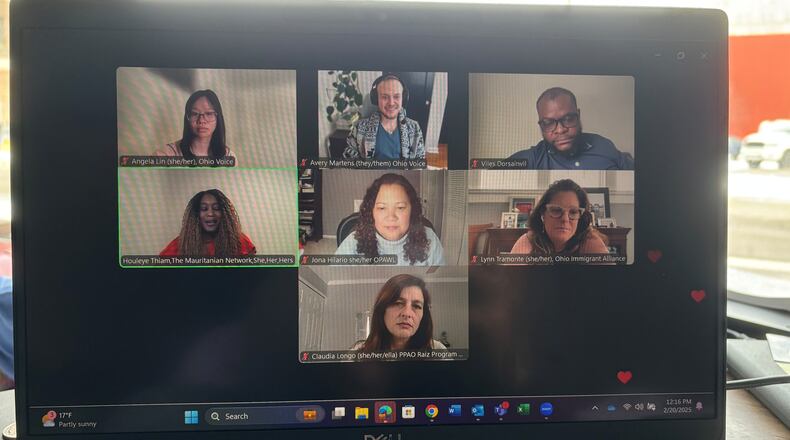“Migration is a fact of human existence and understanding the stories and experiences of those impacted by immigration systems is a necessary step for all of us who are trying to build a better world where we have all of our needs met and we can all thrive,” Avery Martens with Ohio Voice, which hosted the webinar, said.
The Department of Homeland Security made a sweeping policy change Thursday that will see Haiti’s current TPS designation expire in August of this year instead of its originally planned expiration in February 2026. In addition, the department rescinded the Biden administration’s plans of extending the country’s TPS designation.
The Springfield area has around 12,000 to 15,000 Haitian immigrants, many of whom have TPS.
Vilès Dorsainvil, the Haitian community center’s president, shared lessons learned from Springfield’s Haitian population being scrutinized after false rumors were spread by prominent figures including now-President Donald Trump.
“A great percentage of the misinformation is because of people who do not know who are the Haitians, what is our culture, our history and everything,” Dorsainvil said. “And in our organization, not only am I calling people to take time to learn from each other, but we develop a strategy just to go to the community and tell our story and tell who we are, and also try to answer some hard questions about our culture or whatever people have to say.”
Dorsainvil said this approach has been effective and allows for a healthy dialogue.
Houleye Thiam, organizer with the Mauritanian Network, shared a similar sentiment. She said it is critical for immigrants to be part of the conversation.
“You should not be absent from the conversation table,” Thiam said. “When you’re no longer in this world, you let people fill in the gaps, but if you’re able to ... tell your people who you are, when you’re able to dictate how you are perceived, how you are received, how you are understood and remembered, you are able to control your legacy when you’re no longer here.”
Lynn Tramonte, director of the Ohio Immigration Alliance, shared tips for advocating “for fairer immigration policies and processes,” including starting conversations introducing shared values before sharing facts.
“We have to start our conversation with a shared value such as, everybody want to live in a safe community,” Tramonte said. “Everybody wants to be able to have their work respected and their families respected and feel like they are able to bring their best selves to the world. Those are some shared values that we can talk about.”
Tramonte also lauded leaders in the Springfield community for modeling interactions between immigrants and U.S. born citizens. She said research shows that when people see others of different backgrounds “building things together,” it helps them to put themselves in the picture.
“When you look at people in Springfield and when you talk, when you read any article about Springfield and the reaction, it’s always Haitian Ohioans and U.S. born Ohioans working together,” Tramonte said.
Claudia Longo, Raiz program manager at Planned Parenthood, said she would like to see more immigration stories with which people can resonate, as well as more discussions about “how broken the system is.
“The talking point is always, ‘Yes, I’m all for legal immigration; I agree that we should have more immigrants, but do it the right way,‘” Longo said. “OK, let’s talk about that. What’s the right way? Where are those paths? How is this very complex immigration system not allowing people to have an opportunity to apply?”
Advocates also said they are speaking frankly with immigrants about the impacts of the Trump administration, as well as sharing their rights within the country.
Jona Hilario, statewide co-director of OPAWL, encouraged advocates to resist paralysis as “we’re all drinking from a firehose of awfulness.”
“No one person is meant to solve all of these things that we’re talking about, right?” Hilario said. “But we need to learn to be more dependent on one another than we’ve ever been before, because the opposition is counting on us to despair, and that leads us to isolate ourselves.”
About the Author

